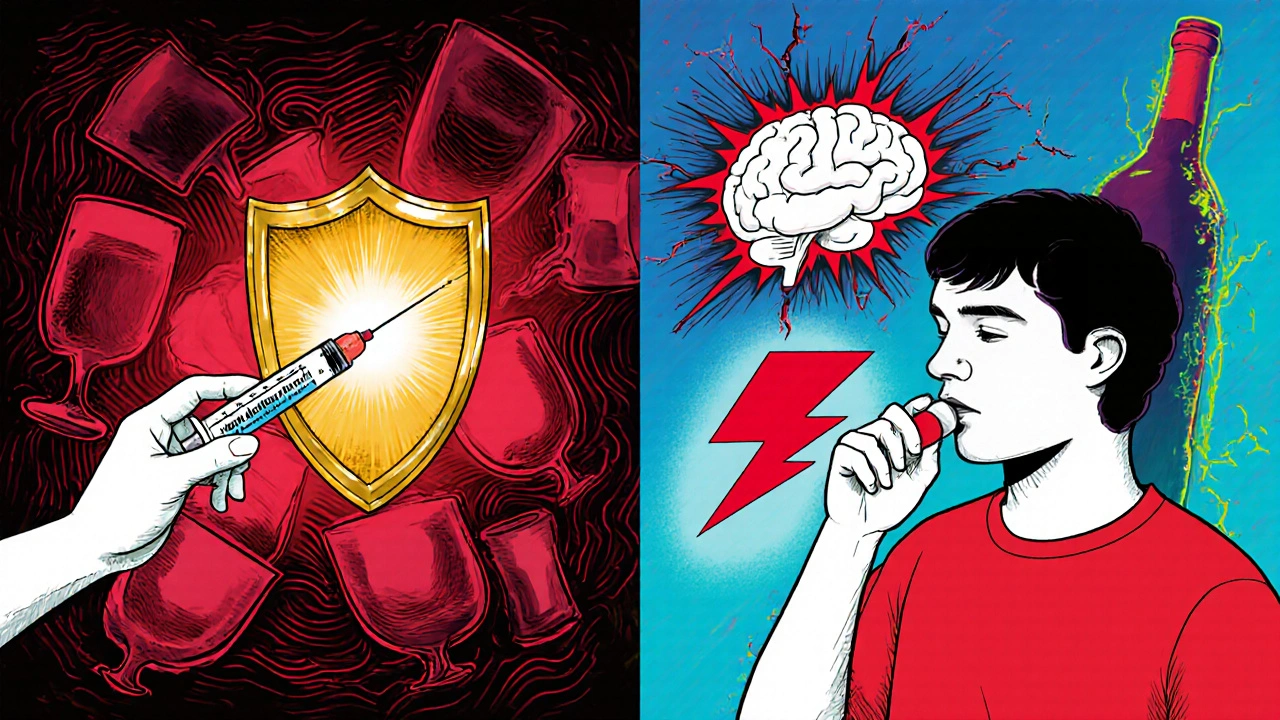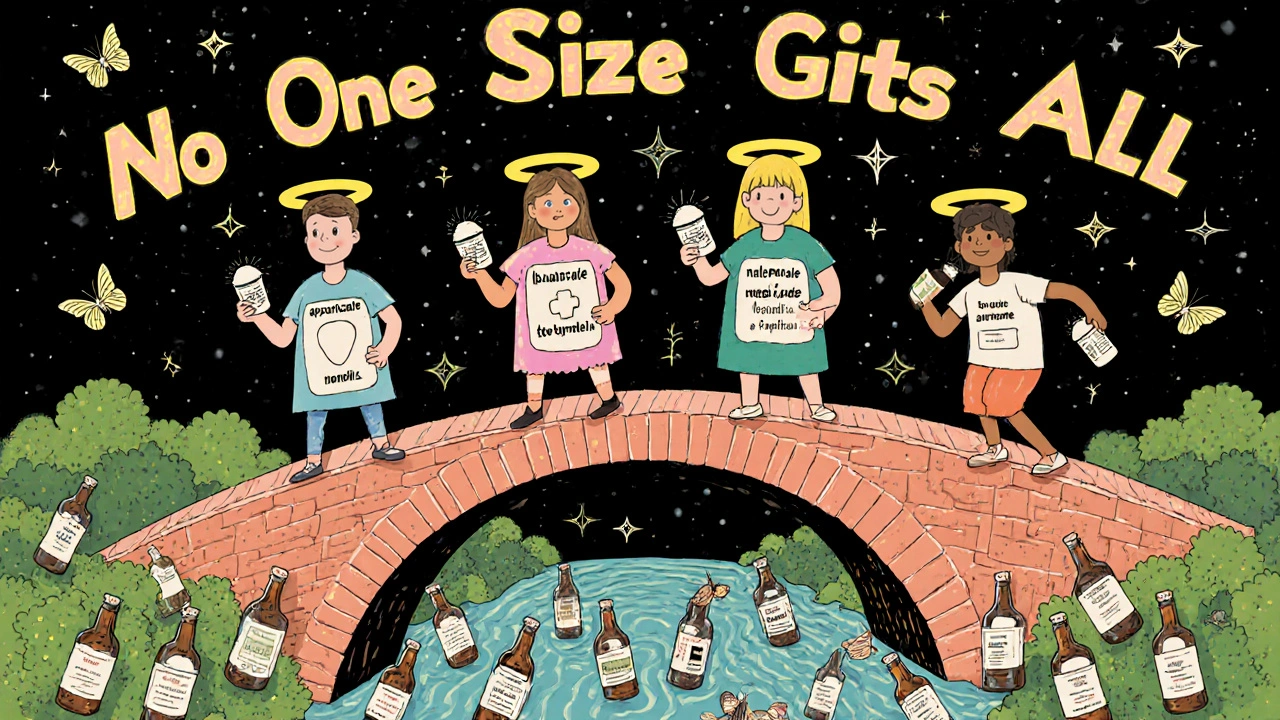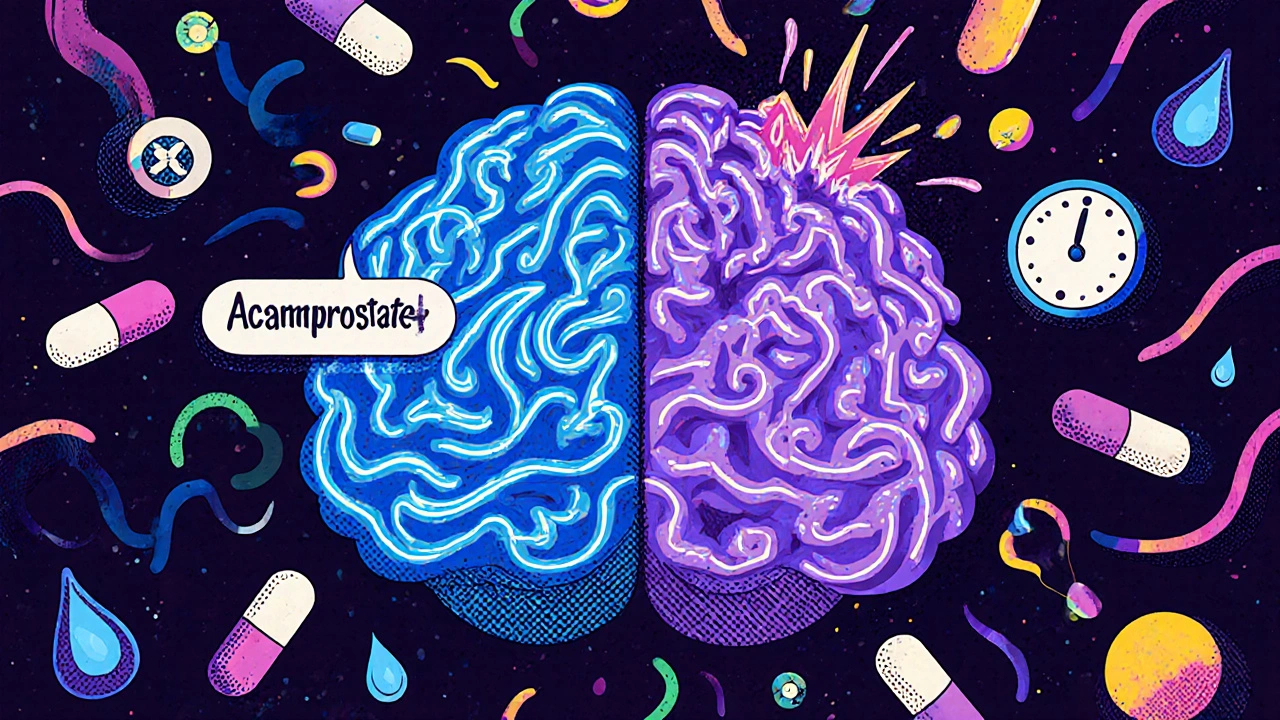Stopping alcohol use is one of the hardest things someone can do. It’s not just about willpower-it’s about brain chemistry. That’s where medications like Acamprol (the brand name for acamprosate) come in. But is it the best option? And what else is out there? If you or someone you care about is trying to stay sober, knowing how Acamprol stacks up against other treatments matters.
What is Acamprol (Acamprosate) and how does it work?
Acamprol is a prescription medication used to help people who have already stopped drinking alcohol stay abstinent. It’s not a cure. It doesn’t reduce cravings right away like some other drugs. Instead, it works by calming down overactive brain signals that happen after long-term alcohol use.
Alcohol changes how your brain handles two key chemicals: glutamate and GABA. When you stop drinking, glutamate surges, causing anxiety, restlessness, and insomnia. Acamprosate helps restore balance. It doesn’t make you sick if you drink. It doesn’t block alcohol’s effects. It just makes the quiet days after quitting feel less overwhelming.
It’s taken three times a day, usually with food. Most people start seeing benefits after 5-7 days, but it takes weeks to work fully. You need to be alcohol-free before starting it. Taking it while still drinking won’t help-and could cause side effects like diarrhea or dizziness.
How does Acamprol compare to naltrexone?
Naltrexone is the most common alternative to Acamprol. It’s sold under brand names like Vivitrol (injection) and ReVia (tablet). Unlike Acamprol, naltrexone targets the brain’s reward system. It blocks opioid receptors, which reduces the pleasure you get from drinking.
If you still crave alcohol and find yourself thinking about it often, naltrexone might help more. Studies show it can reduce heavy drinking days by about 25% compared to placebo. Acamprol, on the other hand, is better at helping people stay completely sober. One 2022 review found that naltrexone was slightly better at reducing drinking, while Acamprol was slightly better at maintaining abstinence.
Side effects differ too. Naltrexone can cause nausea, headaches, and fatigue. It also carries a small risk of liver damage, so blood tests are needed. Acamprol is gentler on the liver but can cause digestive issues. People with kidney problems can’t take Acamprol at all. Naltrexone is usually safe for kidney issues.
Many people choose naltrexone because it’s available as a monthly shot (Vivitrol). No daily pills. No remembering three doses. That’s a big help if you’re still building routines after quitting.
Disulfiram: The deterrent approach
Disulfiram, sold as Antabuse, works completely differently. It makes your body react badly to alcohol. If you drink while taking it, you get severe nausea, vomiting, flushing, and even heart palpitations. It’s a punishment system.
It’s not for everyone. The reaction can be dangerous-especially if you accidentally consume alcohol in mouthwash, cough syrup, or even some foods. People often stop taking it because the fear of reacting is worse than the craving.
But for some, it works. If you’re highly motivated and have a strong support system, disulfiram can be a powerful tool. It’s cheap. It’s been around since the 1940s. And if you take it consistently, your brain starts to associate alcohol with discomfort.
Compared to Acamprol, disulfiram doesn’t help with brain chemistry. It just scares you away from drinking. Acamprol helps you feel normal. Disulfiram makes you feel awful if you slip. Which one you pick depends on your personality and support system.

Topiramate: An off-label option with surprising results
Topiramate is an anti-seizure drug, but it’s used off-label for alcohol dependence. It’s not approved for this use in Australia or the U.S., but studies show it works.
It reduces cravings and helps people cut down or quit. One 2021 trial found that topiramate led to higher rates of complete abstinence than placebo-similar to Acamprol. It also helped with anxiety and sleep issues that often follow quitting.
But side effects are real. Tingling in hands and feet, memory lapses, trouble concentrating, and a metallic taste in the mouth are common. Some people can’t tolerate it. It’s also not safe during pregnancy.
Topiramate might be a good fit if you have anxiety or migraines along with alcohol dependence. It’s not a first-line treatment, but it’s worth discussing if other options haven’t worked.
Other options: Baclofen, gabapentin, and more
Baclofen, a muscle relaxant, is used in Europe and Canada for alcohol dependence. It reduces cravings and withdrawal symptoms. It’s not approved in Australia for this use, but some doctors prescribe it off-label, especially for people with severe withdrawal or liver disease.
Gabapentin, another anti-seizure drug, helps with sleep and anxiety after quitting. It’s not as strong as topiramate for reducing drinking, but it’s gentler. Many people use it as a short-term bridge while waiting for other meds to kick in.
There’s also nalmefene, used in some European countries. It’s similar to naltrexone but taken only when you feel the urge to drink. It’s not available in Australia.
The truth? There’s no one-size-fits-all. What works for your friend might not work for you. That’s why having a doctor who understands your history, lifestyle, and goals matters more than any single drug.
Which medication is right for you?
Here’s a simple way to think about it:
- If you want to stay completely sober and struggle with anxiety or insomnia after quitting → Acamprol is a strong choice.
- If you still drink sometimes and want to cut back → Naltrexone helps reduce how much you drink.
- If you need a strong deterrent and have reliable support → Disulfiram might work.
- If you have anxiety, migraines, or trouble sleeping → Topiramate or Gabapentin could help.
- If you have kidney problems → Avoid Acamprol. Naltrexone or gabapentin are safer.
- If you hate taking daily pills → Ask about Vivitrol (naltrexone injection).
None of these work alone. Medication is most effective when paired with counseling, support groups, or therapy. Even the best drug won’t fix isolation, trauma, or stress. That’s why programs like Alcoholics Anonymous, SMART Recovery, or cognitive behavioral therapy (CBT) are often part of the plan.

What about cost and access in Australia?
In Australia, Acamprol (acamprosate) is listed on the PBS (Pharmaceutical Benefits Scheme), so it’s heavily subsidized. A 30-day supply costs under $30 for concession card holders, and under $100 for others. Naltrexone tablets are also PBS-listed. Vivitrol injections are not subsidized and cost around $1,000 per dose-unless you qualify for a special access scheme.
Disulfiram is cheap-under $20 for a month’s supply. Topiramate and gabapentin are PBS-listed too, but they’re prescribed for other conditions, so your doctor needs to justify the use for alcohol dependence.
Access isn’t the only hurdle. Some GPs aren’t trained in addiction medicine. You might need to see an addiction specialist or go through a program like the Alcohol and Drug Information Service (ADIS) in Victoria to get the right support.
What if nothing seems to work?
It’s not failure if a medication doesn’t help. It just means you haven’t found the right fit yet.
Some people try two or three before finding one that clicks. Others combine meds-like naltrexone with gabapentin. That’s not standard, but some clinics do it under close supervision.
Non-medication options like transcranial magnetic stimulation (TMS) and mindfulness-based relapse prevention are being studied. They’re not mainstream yet, but they’re showing promise.
The most important thing? Don’t give up. Recovery isn’t linear. Some days are hard. Some weeks feel pointless. But people who keep trying-whether with Acamprol, naltrexone, therapy, or just a phone call to a friend-do get sober. And they stay sober.
Can I take Acamprol if I still drink sometimes?
No. Acamprol is only meant for people who have already stopped drinking completely. Taking it while still drinking won’t help and can increase side effects like diarrhea, dizziness, or anxiety. It’s designed to support abstinence, not reduce drinking.
Is Acamprol addictive?
No. Acamprol has no potential for abuse or dependence. It doesn’t cause euphoria, tolerance, or withdrawal symptoms. You can stop taking it at any time without risk. That’s one reason it’s preferred over medications that affect reward pathways.
How long should I take Acamprol?
Most people take it for at least 6-12 months. Some take it for years. There’s no set end date. The goal is to help your brain adjust to life without alcohol. If you feel stable after a year, talk to your doctor about tapering off. Stopping too soon increases relapse risk.
Can I drink alcohol while on naltrexone?
Yes, but you won’t get the usual high. Naltrexone blocks the pleasurable effects of alcohol, which can reduce the urge to keep drinking. However, drinking while on naltrexone doesn’t cause sickness like disulfiram does. It’s not a punishment drug-it’s a dampener.
Are there natural alternatives to these medications?
No natural supplement has been proven to work as well as FDA- or TGA-approved medications. Kudzu, milk thistle, or vitamins may help with liver health or mild anxiety, but they won’t stop cravings or prevent relapse like Acamprol or naltrexone. Don’t replace proven treatments with untested remedies.
What if I can’t afford these medications?
In Australia, Acamprol, naltrexone, topiramate, and gabapentin are all on the PBS, so costs are low with a prescription. If you’re struggling to access care, contact Alcohol and Drug Information Service (ADIS) at 1800 250 015. They can help connect you with free or low-cost clinics, counseling, and medication support programs.
Next steps: What to do now
If you’re considering treatment, start by talking to your GP. Bring a list of your drinking habits, any past attempts to quit, and your goals. Are you aiming for total abstinence? Or just cutting back? That changes which medication makes sense.
If your GP isn’t experienced in addiction, ask for a referral to an addiction specialist or a clinic like the Victorian Alcohol and Drug Service. You don’t need to figure this out alone.
Medication is just one tool. Therapy, peer support, and lifestyle changes matter just as much. The best outcome comes from combining all of them.

Ted Carr
So let me get this straight-we’re prescribing brain chemistry adjustments like they’re coffee creamer, and nobody’s asking why we’re medicating a social problem with pharmaceuticals? This is just the latest chapter in the Great American Addiction Industrial Complex.
Rebecca Parkos
I’ve been sober 14 months and naltrexone saved my life. Not because it’s magic, but because it took the fog out of my cravings. I didn’t feel like a zombie-just like me, but clearer. If you’re scared to try meds, talk to someone who’s been there. You’re not weak for needing help.
Bradley Mulliner
Of course the pharmaceutical companies love acamprosate-it’s a lifelong maintenance drug with zero abuse potential. Genius business model. Meanwhile, disulfiram’s been around since the 1940s and nobody wants to talk about how it’s essentially chemical coercion. We’ve turned recovery into a compliance checklist.
George Clark-Roden
There’s a quiet truth here: none of these drugs fix the loneliness. They just make the silence between drinks less terrifying. I took acamprosate for a year. It didn’t change my mind-I changed my mind. The meds just gave me the space to do it. Recovery isn’t about chemistry. It’s about showing up, day after day, even when you don’t feel like it.
Rahul hossain
Who the hell writes a 2000-word essay on alcohol meds and forgets to mention the elephant in the room? Trauma. Childhood abuse. PTSD. All these drugs are just Band-Aids on a bullet wound. If your brain got broken by years of neglect, maybe you need a therapist, not a pill schedule.
Bonnie Sanders Bartlett
I’m a nurse who’s seen this up close. People think meds are a crutch. They’re not. They’re a bridge. I’ve watched men and women walk across that bridge-slowly, painfully, beautifully-and find themselves again. Don’t shame the process. Honor the effort.
Sai Ahmed
Did you know the FDA approved acamprosate after a single 12-week trial with 127 people? And Vivitrol? The injection? It was pushed by a pharma exec who had a cousin who drank too much. There’s no science here-just marketing. They want you dependent on the system, not free from alcohol.
Melissa Delong
Topiramate causes brain fog? That’s a feature, not a bug. If your thoughts are loud and chaotic, maybe you need them quieter. I took it for six months. My anxiety didn’t vanish-but my urge to drink did. Sometimes, the side effect is the cure.
Jonathan Debo
Let’s be precise: acamprosate does not ‘restore balance’-it modulates glutamatergic hyperactivity via antagonism at the mGluR5 receptor and partial NMDA inhibition. The post’s anthropomorphic language is dangerously reductive. Also: ‘quiet days after quitting’? That’s poetic nonsense. It’s neuroadaptation. Not a meditation retreat.
Robin Annison
I wonder if we’re asking the wrong question. Instead of ‘which drug works best?’ maybe we should ask: ‘what kind of life are we trying to help people rebuild?’ The medication is just one thread. The real fabric is connection-to family, to purpose, to a community that doesn’t judge you for yesterday.
Abigail Jubb
I tried everything. Acamprol made me feel like a ghost. Naltrexone gave me migraines. Disulfiram? I almost called 911 when I licked a spoon with vodka residue. I finally quit by going to a Buddhist retreat in Oregon. No pills. Just silence. And a really good yoga mat.
Hope NewYork
Why do we always think the answer is a pill? What if we just… talked to each other? Like, real talk. Not ‘how’s your week?’ but ‘what are you scared of?’ I didn’t stop drinking till someone looked me in the eye and said, ‘I see you.’ No meds. Just presence.
Albert Schueller
Acamporol? I think you mean acamprosate. And if you’re going to write about meds, at least spell them right. Also, Vivitrol costs 1000 bucks? That’s why people relapse-because the system is rigged. Big Pharma profits. You suffer. And your GP? They’re too busy to care.
Reginald Maarten
Actually, the 2022 review you cited-meta-analysis by Gual et al., Lancet Psychiatry-showed no statistically significant difference in abstinence rates between acamprosate and naltrexone at 12 months (p=0.17). The ‘slightly better’ framing is misleading. Also, gabapentin’s efficacy in alcohol use disorder is supported by a 2020 Cochrane review with moderate quality evidence. You omitted that. And topiramate? Dose-dependent cognitive side effects are dose-dependent. You didn’t mention titration protocols. This is sloppy.